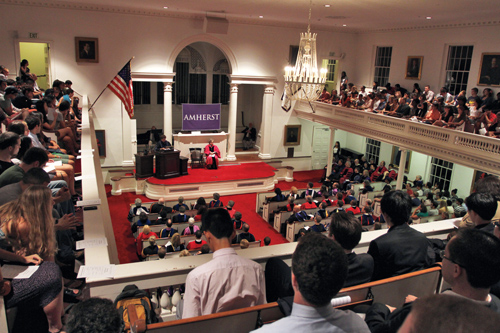By Peter Rooney
President Martin used her convocation address to counter attacks on liberal arts education.
[Speeches] In this year’s convocation address, President Biddy Martin took on those who question the value of a liberal arts education by describing her own background and the role Amherst plays in reducing prejudice and ignorance.
“I’m a little worked up about some of the attacks on liberal arts education and higher education in general,” she told the Class of 2017 in Johnson Chapel. “Calls to keep higher ed accessible, affordable and of high quality are legitimate and have to be heeded, but some of the gleeful proclamations of disruption and demise are pernicious.”
Like 18 percent of the new class, Martin was a first-generation college student. She said she was raised “in an environment and a family that feared education because it has the power to change us.” Because of her experiences, she said, she’s thought a lot “about the benefits of education, but also about what can be difficult in it.”
What can be difficult, she said, is “combining the intellectual quality of this community with an effort to take better advantage of the differences among us.”

Photo by Megan Robertson ’15
One way to break out of the “prison house of ignorance and prejudice,” she said, is for students to build not only “bonding” relationships with people who are comfortably similar to themselves but also “bridging” relationships with those from other backgrounds.
Citing research by Amherst psychology professor Elizabeth Aries and others, who have found that white U.S. students from more privileged backgrounds tend to do the least crossing of boundaries in their friendship networks, Martin urged all students to use their time at Amherst to resist the “comfort and safety” of insular networks.
“The friendships you form here matter, and they matter not only to you as individuals or to the institution, but they matter on a much larger stage,” she said. “The relationships we build here are experiments in the kind of social world we could imagine and would like to have.”